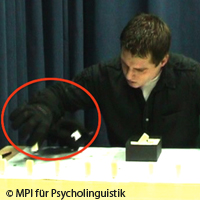Glove experiment alters right-handers' moral judgement
Right-handers unconsciously associate good with the right side of a space and bad with the left side. But research carried out by scientists in the US shows that this association can be rapidly changed. The study, published online in the journal Psychological Science, reveals that even a few minutes of using the left hand more fluently than the right can reverse right-handers' judgements of good and bad, making them think that the left is the 'right side' of space. Researchers Daniel Casasanto of the Max Planck Institute for Psycholinguistics in the Netherlands and Evangelia Chrysikou from the University of Pennsylvania in the US explained how conceptions of good and bad are rooted in people's bodily experiences, and can change when patterns of bodily experience change. In language, positive ideas are linked with the right side of space and negative ideas with the left. For example, it is good to be 'in the right', but bad to be 'out in left field'. In their paper in Psychological Science, the researchers noted that the different connotations of left and right are also visible in various religious texts. They cited, for example, the King James Bible, which states that 'the wise man's heart is at his right hand; but the fool's heart is at his left' and commented that 'according to Islamic law, Muslims should use their right hand for eating and drinking because only Satan uses his left'. In their experiments, when people were asked which of two products to buy, which of two job applicants to hire, or which of two alien creatures looks more intelligent, right-handers tended to choose the product, person, or creature they saw on their right, but most left-handers chose the one on their left. To explain this tendency, Dr Casasanto proposed that people's conceptions of good and bad depended, in part, on the way they use their hands. 'People can act more fluently with their dominant hand, and come to unconsciously associate good things with their fluent side of space,' he suggested. To test this theory, Dr Casasanto studied how natural right-handers think about good and bad when their right hand is handicapped, either due to brain injury or something less extreme such as wearing a ski glove. They asked stroke patients to complete a task that reveals implicit associations between space and goodness in healthy participants. Their studies revealed that patients who had lost the use of their left hand showed the usual right-is-good pattern. However, those who had lost the use of their right hand following damage to the left-hemisphere of the brain associated good with left, like born left-handers. The same pattern was found in healthy university students who performed a motor fluency task while wearing a bulky glove on either their left hand -to preserve their right-handedness - or on their right hand, to turn them temporarily into left-handers. After about 12 minutes of lopsided motor experience, the right-gloved participants' judgements on an unrelated task showed a good-is-left bias, like natural left-handers. 'This finding does not rule out the possibility that innate neurobiological factors also contribute to the body-specific mappings observed in natural right- and left-handers,' the researchers admit. 'But the fact that right-handers' judgments reversed with long- or short-term changes in motor fluency demonstrates that motor experience is sufficient to determine the direction of space-valence associations, and even to overwhelm any innate predisposition to associate 'good' with one's naturally dominant side.' 'People generally think their judgements are rational, and their concepts are stable,' noted Dr Casasanto. 'But if wearing a glove for a few minutes can reverse people's usual judgements of what's good and bad, perhaps the mind is more malleable than we thought.' The researchers conclude: 'The challenge for future research is to characterise the neurocognitive mechanisms by which physical experience generalises to shape abstract conceptions of good and bad.'For more information, please visit: Max Planck Institute for Psycholinguistics:http://www.mpi.nl/Psychological Science - click:http://www.psychologicalscience.org/index.php/publications/journals/psychological_science (here)
Countries
Netherlands, United States



